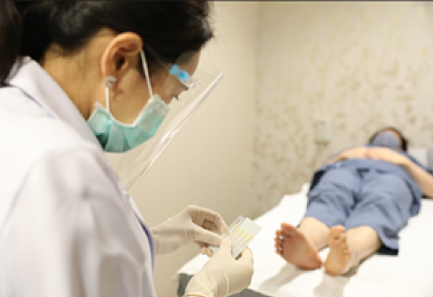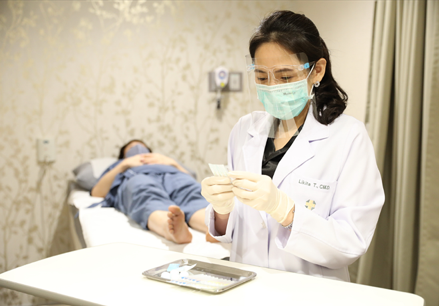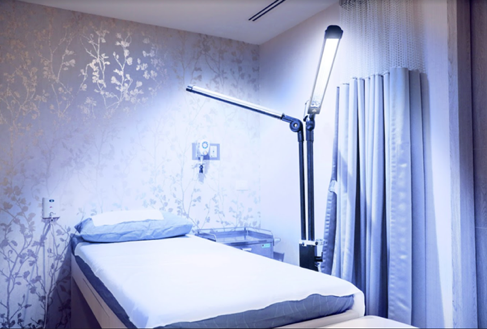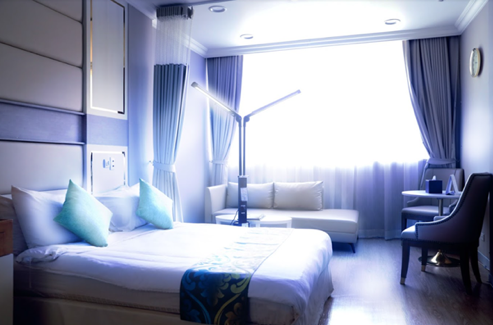Sleep Problems Can be Overcomed
HIGHLIGHTS:
- We usually average between 6–7 hours of sleep a night. However, if we do not get enough sleep, it can impact our health in a way that is equivalent to or greater than regularly smoking, having high blood pressure, or suffering with heart disease.
- Being unable to sleep may be a result of stress, hormone deficiencies, snoring, restlessness, sleep walking, or frequent nightmares. All of these factors can lead to waking up feeling exhausted and unrefreshed. Therefore, seeking medical attention from a specialist in the field to diagnose the true causes and begin treatment is essential.
If you regularly experience 3 of the following 4 symptoms, it could be a sign that you are not getting enough quality sleep: insomnia due to restlessness, snoring, sleep apnea, or idiopathic exhaustion.
The physical impacts of insufficient sleep
People generally average between 6–7 hours of sleep each night, except for children who require more than that. Moreover, research has found that people who regularly do not get enough sleep experience health issues equivalent to or greater than those who smoke regularly, suffer with high blood pressure, or have heart disease.
Adults: People who regularly sleep late place themselves at risk of high blood pressure, heart disease, heart failure, stroke, and obesity, while their ability to do their job is also compromised as thinking times and decision-making skills are negatively affected. Additionally, the subsequent issues can often extend into mental health, with emotional stability, depression, and much more besides all significant risks. Moreover, losing attention, even momentarily, increases the likelihood of being in a serious accident, which is a common cause of death nowadays.
Children: Children who do not get sufficient sleep can experience developmental issues, including shortened attention spans, which can negatively impact their studies.
What are the reasons behind insomnia?
- Caffeinated beverages, such as tea, coffee, and fizzy drinks
- Alcoholic drinks
- Eating too many sweets before bedtime as sugar stimulates the body, or eating food high in sodium, which increases blood pressure, causing restlessness and difficulties sleeping
- Overconsumption of rich and oily foods in the evening or before bed could affect sleep quality.
- Eating a buffet-style meal before bed will lead to difficulties falling asleep.
- Stress and mental health issues
- Snoring or sleep apnea
- Hormonal deficiencies, such as elevated cortisol and melatonin levels, as well as those associated with the andropause and menopause
- Restless leg syndrome, which causes an uncontrollable urge to move the legs, usually because of an uncomfortable sensation, which mostly occurs during the night (severe cases can cause insomnia)
Try making these changes if you are having trouble sleeping
- Set yourself a regular time to go to sleep each night and make sure to get straight out of bed when waking up in the morning.
- Avoid working, playing on your phone, and reading when in bed.
- Ensure the bedroom is dark, quiet, and has good airflow, while also maintaining the right temperature for sleep.
- Avoid napping during the day because this could affect sleep at night.
- Be careful not to eat large or overly rich meals in the evening as this could lead to stomach discomfort and difficulties getting to sleep.
- Avoid drinking alcohol or caffeinated beverages during the evening.
- Avoid drinking too many liquids just before bedtime as it could result in you needing to get up to go to the bathroom during the night.
- Try bathing or showering in warm water prior to bedtime as this relaxes muscles and may make it easier to fall asleep.
Samitivej sleep solutions: Taking care of all your sleep-related needs
Getting enough sleep is the foundation of good health.
Click here to read more about our programs designed to solve your sleep problems.


Checking that needles have been disinfected and stored in safe packaging prior to their use in acupuncture procedures.

UVC disinfectant equipment being used in patient rooms.

UVC disinfectant equipment being used in snoring and sleep apnea screening (sleep test) rooms.
Related
articles